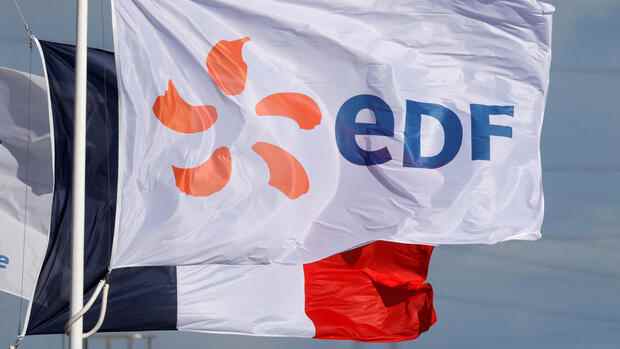Paris France is speeding up the nationalization of the heavily indebted electricity giant Électricité de France (EDF): At the end of September, the private shareholders of the group are to receive a purchase offer, and a month later Paris wants the transaction to be sealed.
The French government is allowing the takeover to cost 9.7 billion euros – the sum is just the beginning of the enormous expenses that the state will have to spend with EDF.
The Ministry of Economy and Finance made the details of the decision public on Tuesday. With full nationalization, Paris wants to secure control over electricity production in the energy crisis before winter and guarantee upcoming investments in renewable energies and nuclear power plants.
President Emmanuel Macron had already spoken about a possible nationalization of EDF in the spring. At the beginning of July, his Prime Minister Élisabeth Borne then announced in a speech in Parliament that the partial privatization of the electricity company from 2005 would be reversed.
In the middle of last week, trading in EDF shares on the Paris stock exchange was suspended until the purchase intentions were specified.
State offers twelve euros per share certificate
Now it is clear: the government is offering EDF shareholders twelve euros per share. The offer is 53 percent above the closing price on July 5, the day before Borne’s speech. However, it is only a good third of the issue price of 32 euros, with which Paris 17 years ago brought part of the group shares to the stock exchange.
The French state currently owns 84 percent of EDF. One percent of the shares are owned by the employees, 15 percent are owned by institutional investors and small shareholders. The Ministry of Finance said it had tried to find a “fair price” for both shareholders and the public sector.
After the offer was announced, trading in EDF shares resumed on Tuesday, the price soared and settled just below the twelve euros promised by the state. Market observers expected the government to reach the required 90 percent capital threshold for the group to be delisted. “The offer looks attractive, the probability of success is high,” said Citigroup analyst Piotr Dzieciolowski.
However, the workforce involved in the group’s capital is dissatisfied. An association of current and former employees of EDF announced a lawsuit. As the majority shareholder, the state plundered the company’s coffers with “reckless decisions” and is partly responsible for the fact that the price is well below the former issue price of 32 euros. A “large number of investors” have lost money.
The French state has to spend billions to renew old nuclear power plants.
(Photo: Reuters)
The funds for the nationalization are estimated in a supplementary budget, which, however, still has to be approved by Parliament. Macron’s government has not had an absolute majority in the National Assembly since the general election defeat in June. However, the Ministry of Finance was confident of being able to convince opposition representatives of the project.
>> Read also: Between inflation and debt – France is putting together a package worth billions to boost purchasing power
Once this hurdle has been cleared, the government intends to submit its takeover bid to the financial regulator AMF in early September. The deadline for private shareholders to sell their shares is between the end of September and mid-October. At the end of October, according to plans in Paris, EDF’s stock market chapter will be over.
The Ministry of Finance said that the path chosen for the nationalization of a takeover bid for the shareholders does not have to be approved by the EU Commission. However, Brussels had been informed of the plans. Regarding the Commission’s potential competition concerns, a government official made it clear that any form of EDF split-up would be “a red line” for France.
The power company posted a profit of around five billion euros last year. However, the debt of more than 40 billion euros and the long-term investment requirements in the three-digit billion range weigh on the prospects.
The current problems with the nuclear power plant are also putting pressure on EDF’s balance sheets. About half of the 56 reactors in France have been idle for months.
Macron has announced the construction of up to 14 new nuclear reactors. Further expenditure arises from the renovation of existing nuclear power plants, many of which already have operating lives of more than 40 years. The President hopes to extend the life of the reactors to more than 50 years. Massive investments are also to be made in the expansion of renewable energies, especially in wind power.
EDF must finance electricity price cap
The government is currently looking for a successor to EDF boss Jean-Bernard Lévy, who had recently expressed his displeasure with state intervention in the group more and more clearly. Among other things, Lévy criticized the fact that EDF had to sell nuclear power at significantly reduced prices in order to finance the electricity price cap introduced by the government in the fight against high energy costs.
Energy expert Jean-Michel Gauthier from the Paris finance school HEC said that there was no alternative to nationalization. “As a listed company, EDF would not have been able to continue its activities.” For years, the regulatory authorities have been forcing the group to cede cheaper nuclear power to the competition and then to buy electricity for its own customers on the spot market at more expensive prices.
EDF would not have been able to support the desired investments in nuclear and wind power. “That would have meant bankruptcy,” said Gauthier.
More: France fears for the electricity from its nuclear reactors – and is thus exacerbating the energy crisis in Europe.
